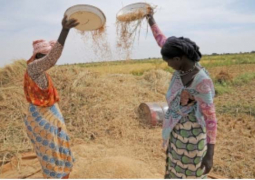But is this possible amidst the prevailing circumstances of the growing population, growing food dependence, food wastage, climate change, land degradation, inadequate investments in the agricultural sector and the escalating poverty in Africa? Can we produce what we eat and eat what we produce?
Africa’s most pressing problem is in defining our destiny and how to get there. The continent has, however, failed to face its challenges and turn them into opportunities for prosperity and transformation. Instead, we always call for the intervention of other people whose interest may be different from ours. With food insecurity and poverty, we need to change our attitude. We have resources and grand plans, which should be followed by great actions geared at achieving great lives, especially when determining a joint vision for our destiny.
Research indicates that hunger arises from lack of income, not from the physical absence of food. This is true even in case of famine, the most dramatic and gruesome expression of hunger. By far more people are malnourished or undernourished than are affected by outright famine. Even if one substantially reduces World Bank (2007) estimates, that 50 per cent of Africans are malnourished and 25 per cent seriously so, one still has tens of millions of malnourished people.
These are the poorest urban families, slum dwellers, poor rural peasants and landless labourers. In terms of numbers, the largest groups are the poor peasants with some land but not enough (or not good enough) to provide subsistence without additional remittances.
Clearly, changing climate patterns come into play. People run short of food at particular seasons of stress, typically the growing season prior to the main or only harvest.
At this time food stocks are at the lowest, labour requirements tend to peak, and in many cases rainy weather means increased incidence of illness. There is no doubt about the socio-economic determination of hunger. Poor peasants suffer most seasonal food stress because they lack reserves and adequate food storage infrastructure and they end up wasting or losing a lot of food.
We, therefore, need to highlight a major campaign to cut massive levels of global food loss and waste in support of the Environment Day’s Think, Eat, Save ideology. All the campaign aspects should aim at promoting actions by consumers and food retailers to dramatically cut the 1.3 billion tonnes of food lost or wasted every year, which - aside from the cost implications and environmental impacts - increase pressure on already strained global food system.
No economic, environmental or ethical argument can be made to justify the current extent of food waste and loss in Africa. Consumers and policy makers can push for change with a thinking that the astonishing amount of food we throw away is not just edible and nutritious, but also delicious.
According to the Food and Agricultural Organisation, roughly 95 per cent of the food loss and waste in Africa is unintended and usually happens at early stages of food production and supply chain due to financial, managerial and technical limitations in harvesting techniques, storage and cooling facilities in difficult climatic conditions, infrastructure, packaging and marketing systems.
Food preservation is an effective way of saving food and preventing waste and loss. In fact, African communalities have been employing food saving methods for centuries in order to prolong its shelf life. What happened to the drying of cassava and sweet potatoes before storage, smoking of meat and fish, storage of dry cereals mixed with ash in ebyagi (traditional stores) and preserving milk in form of ghee and powder and storing fresh food in earthed pots?
Clearly, a more efficient food supply is key to feeding a projected population of 9 billion by 2050.
Otherwise, the presence of scavengers, cats, dogs and pigs in and around Kampala indicate that there is plenty of food dumped on rubbish dumps for a variety of reasons - because people buy on impulse, purchase items that are almost past their sale-by-date, cook more food than they can eat, eat more than enough, or buy food that is never eaten. May be we need to introduce eating etiquette lessons for the masses to enhance knowledge on food discipline, wise use and sustainable management of food.
Guest commentary - source: Daily Monitor Uganda Commentary by Dr Majwala president of Sustainable World Initiative - East Africa. majormeaud@gmail.com
“We owe it to ourselves and to the next generation to conserve the environment so that we can bequeath our children a sustainable world that benefits all.”
Wangari Maathai
Read Other Articles In Article (Archive)



